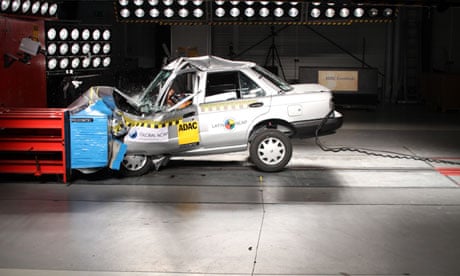It's nothing less than a disgrace when major companies put the lives of their customers at risk in order to maximise profits.
It would be even worse if multinationals were to discriminate against those in the developing world to offset declining profits in traditional western markets, where similar behaviour would not be tolerated.
Yet, this is exactly what three of the world's largest car manufacturers stand accused of after being found to be selling sub-standard vehicles in Latin America that do not meet even the most basic safety standards.
General Motors, Renault-Nissan, and Suzuki are manufacturing models that in new independent crash tests failed to score even a single star, while their equivalent models in Europe and America often score a minimum of four out of five stars.
The results are even worse than the crash tests carried out last year, in which the Renault Sandero and the JAC 3, produced by the Chinese state-owned vehicle-maker JAC Motors, were awarded only one star.
No wonder Max Mosley, global chairman of the New Car Assessment Programme (NCAP), was prompted to write to the CEOs of the three companies accusing them of putting the lives of western customers ahead of those in the developing world.
"Global NCAP is concerned weak sales and deteriorating profits in traditional markets are encouraging car companies to take unnecessary risks on safety in emerging markets," says Mosley. "Unregulated emerging markets make it too easy for car companies to produce products that shortchange customers on safety. If CEOs know their products do not meet global safety standards, they should take responsibility and act now. The lives of customers in Latin America are no less valuable than those in Europe, Japan and North America."
Mosley is calling on the three companies to apply the UN's minimum crash safety standards to their global passenger car production.
Tests carried out on the Chevrolet Agile, Renault Clio Mio, Nissan Tsuru and Suzuki Alto K10 showed they all have major structural weaknesses which pose an unacceptably high risk of death or injury in the event of a crash. All the models lacked any air bags.
The results for the Nissan Tsuru were the most disturbing with the vehicle structure coming close to total collapse. The car is also fitted only with two-point seatbelts instead of the conventional three-point seatbelts in the rear, making it impossible to fit a child seat properly.
Global NCAP's Technical Director Alejandro Furas said that "body structures that collapse onto the people inside can have fatal or life-threatening consequences in real-world crashes. These zero rated cars are built by companies that produce good, safe five-star cars and at affordable prices for buyers in other parts of the world. Now is the time for car buyers in Latin America to be able to choose five star models that exceed global safety standards."
In the letter to Nissan CEO Carlos Ghosn, Mosley calls on the company to "ensure they do not produce sub-standard cars that fail to meet these minimum global safety standards. This would promote regulatory harmonisation and guarantee that levels of occupant protection that are legal requirements in Europe and North America are also applied in the rapidly growing automobile markets of Latin America and elsewhere."
The letter to General Motors CEO Daniel Akerson points out that the test on the Chevrolet Agile showed that "during the front impact test, the dummies recorded high forces and the vehicle structure proved unstable, with almost all the welding spots in the foot well failing and the area bursting open."
In contrast, Mosley congratulates SEAT for its Leon model which was awarded five stars, and which he says proves that "manufacturers can produce small cars for the region with stable structures and good protection".
One would hope for a mature response from Nissan to the concerns that have been raised but all the company would say officially is that "the Tsuru meets safety regulations in the markets where it is sold. It is one of the best-selling sub-compact vehicles in our market due to its proven affordability, durability and reliability."
A spokesman for Renault said: ""Clio Mio/Novo was tested without airbags. This configuration complies with regulations on the markets where it is sold, since airbags are not obligatory under South American regulations. From January 2014, all Clio Mio/Novo vehicles will ship with a driver airbag. The version of Clio Mio/Novo tested by LatinNCAP delivers a level of safety that is the same or even greater than its direct competitors in this segment. All these models, tested in 2012, scored one star in LatinNCAP. The more stringent test process adopted for LatinNCAP tests explains why Clio Mio/Novo, tested in 2013, received no stars"
Beyond the fact that Latin America is a rapidly-growing car market, it already has the world's highest per capita fatality rate from road crashes – 26 fatalities per 100,000 people. This is estimated to rise further to more than 30 per 100,000 by 2020.
The Latin NCAP was created four years ago to provide consumers in the region with an independent safety assessment of new cars, to embarrass manufacturers into improving performance and to encourage governments to apply UN vehicle crash test regulations. The Euro NCAP crash test has been in operation since 1997 and is considered a key selling point for manufacturers.
This content is brought to you by Guardian Professional. Become GSB member to get more stories like this direct to your inbox

Comments (…)
Sign in or create your Guardian account to join the discussion